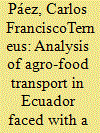|
|
|
Sort Order |
|
|
|
Items / Page
|
|
|
|
|
|
|
| Srl | Item |
| 1 |
ID:
176892


|
|
|
|
|
| Summary/Abstract |
The objective of this article is to analyze the food transport in Ecuador faced with a possible reduction in the subsidy of diesel, taking as a case study the Metropolitan Public Company Wholesale Marketplace of Quito, in order to identify guidelines for the formulation of strategies in the event of a reduction in the subsidy of this fuel. A bottom-up methodology is applied, which uses a survey as a tool, as well as secondary information generated by the state organizations. It is concluded that this investigation identifies the agro-food transport sector of the Wholesale Market. The median fuel consumption and energy intensity, of trucks that arrive with products at the Quito Wholesale Market, are 31 (l/100 km) and 15 (l/100tkm), respectively. The median percentage of the cost of fuel, with respect to the price of the product, is 1.2%. Meanwhile, assuming that the fuel subsidy was eliminated, and the price of diesel came to cost $ 2.27 USD/gallon; the median percentage of price increase in the product would be 1.6%. However, the low regulation on the sector makes the cost of agri-food more susceptible to a decrease in the subsidy.
|
|
|
|
|
|
|
|
|
|
|
|
|
|
|
|
| 2 |
ID:
069758


|
|
|
| 3 |
ID:
169853


|
|
|
|
|
| Summary/Abstract |
Nationwide transitions from cooking with solid fuels to clean fuels promise substantial health, climate, and environmental benefits. For decades, Ecuador has invested heavily in consumption subsidies for liquified petroleum gas (LPG), a leading clean fuel. With the goal of understanding household energy use in a context where LPG is ubiquitous and cheap, we administered 808 household surveys in peri-urban and rural communities in coastal and Andean Ecuadorian provinces. We assess cooking fuel ownership and use patterns after long-term LPG access and the reach of induction stoves promoted through a recent government program.
|
|
|
|
|
|
|
|
|
|
|
|
|
|
|
|
| 4 |
ID:
132652


|
|
|
|
|
| Publication |
2014.
|
| Summary/Abstract |
The petroleum sector contributes substantially to the Nigerian economy; however, the potential benefits are diminished due to the existence of significant subsidies on imports of petroleum products. Subsidies on imported petroleum products are considered to be an important instrument for keeping fuel prices, and hence the cost of living, low. The costs of these subsidies, however, has risen dramatically in recent years due to increased volatility in world petroleum and petroleum product prices and increased illegal exportation of subsidized petroleum products into neighboring countries. Removing the subsidy on fuel is one of the most contentious socio-economic policy issues in Nigeria today. In this paper, an economy-wide framework is used to identify the impact of removing the fuel subsidy on the Nigerian economy and investigates how alternative policies might be used to meet socio-economic objectives related to fuel subsidies. The results show that while a reduction in the subsidy generally results in an increase in Nigerian GDP, it can have a detrimental impact on household income, and in particular on poor households. Accompanying the subsidy reduction with income transfers aimed at poor households or domestic production of petroleum products can alleviate the negative impacts on household income.
|
|
|
|
|
|
|
|
|
|
|
|
|
|
|
|
|
|
|
|
|